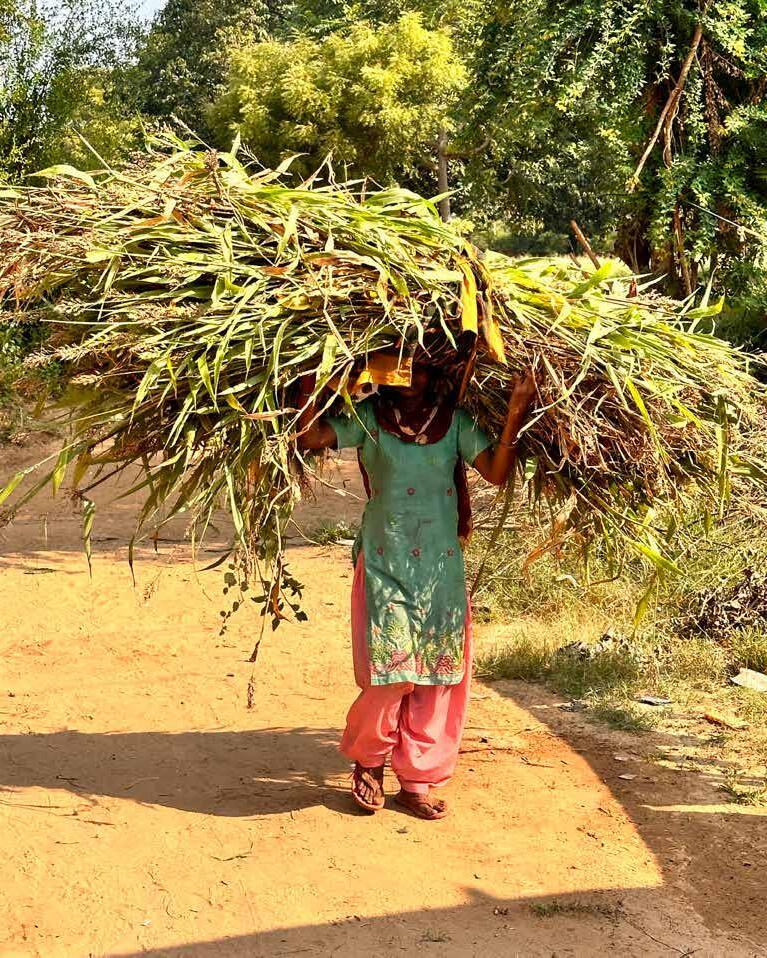AGENCY
The capacity for people to make their own choices.

booming buffalo business
Here’s to the entrepreneurs!
Trekking Kokoda for Opportunity


The capacity for people to make their own choices.

booming buffalo business
Here’s to the entrepreneurs!
Trekking Kokoda for Opportunity

As the world moves closer to the 2030 deadline for the Sustainable Development Goals, the statistics are not looking great.
According to the World Bank, there are still 1.73 billion people worldwide, or more than one in five people, living below the poverty line, existing on less than US$3.65 a day.
The latest Goalkeepers report from the Bill and Melinda Gates Foundation estimates that by 2030, one in three people will be outside the reach of health services.
At Opportunity International Australia, the expansion of our health program aims to tackle this problem. Without basic knowledge and healthcare, families especially in remote and rural areas globally, will continue to get sick with basic illnesses that are easily prevented.
When people are healthy, the chances of improving their livelihood increases. It is estimated that approximately one billion people each year are plunged into poverty due to unexpected medical expenses.
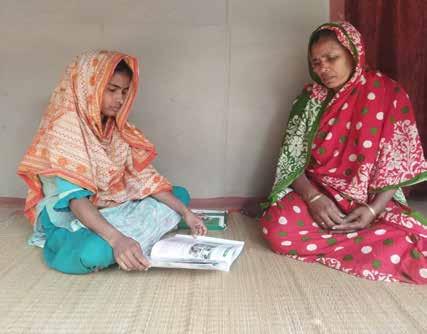
Conservative estimates suggest that one in five households worldwide is served by microfinance organisations, with many of these people living in poverty and in remote areas beyond the reach of health services, both private and public.
Family health issues are the main reason people default on small loan repaymentshighlighting the burden of health-related expenses on families trying to work their way out of poverty.
In 2025, Opportunity is focusing on the improvement of healthcare for more communities currently out of reach of their national health system. We are training more Health Leaders in India and Bangladesh, and expanding to Nepal and Africa.
Our goal is to address gaps in the healthcare system, achieve better health for people living in poverty and help communities to thrive.
We couldn’t do this important work without you. Thank you for your generosity in 2024. I wish you and your loved ones a happy healthy and safe Christmas.
Speaking of Christmas, if you’re looking for Christmas gifts for friends and family, why not consider something from our Gifts of Opportunity catalogue? There are gifts to suit every budget, and they are all tax-deductible! Spread the joy of giving with your loved ones, and help families living in poverty.
With blessings and gratitude,
Scott Walters Chief Executive Officer Opportunity International Australia
Opportunity International Australia is delighted to welcome two new Directors to our Board, Jai Sharma and Stephanie Judd.
With combined experience across many professional sectors, including impact investment, law, not-for-profit management, banking and finance, Jai and Stephanie both bring a wealth of knowledge and insight to our Board of Directors, and a heart for our impactful programs supporting families living in poverty.
Jai Sharma is the General Manager of SDG Capital, a funding and capital advisory business supporting non-profit clients. He is a seasoned impact investment specialist with a career spanning superannuation, funds management and social entrepreneurship.
A serial social entrepreneur, Jai has started and exited multiple mission driven start-ups and has advised a number of prominent social enterprises and impact investment funds globally. In 2010, Jai also founded a small but pioneering rescue and rehabilitation program for vulnerable girls in North India.
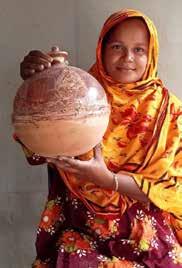
Stephanie Judd is a senior associate at Prolegis Lawyers, where she advises the philanthropic and charity sector. Prior to joining Prolegis, she worked in a major Australian law firm in the banking and finance team, with a focus on social finance and impact investment.
“The challenges we face as a global community can feel daunting in their enormity and complexity. Addressing them requires the most creativity we can muster! One of the things that I find most exciting about Opportunity’s model is just that: it is scalable, sustainable, and smart,” says Stephanie.
On joining the Opportunity Board, Jai said “I have always felt that three things hold incredible potential to genuinely move the needle on global poverty – Christ-like love, the power of financial markets directed for good and models of development that are genuinely self-scaling.
Opportunity International Australia has a unique DNA that embodies all of these and I couldn’t be more excited to be serving this organisation and the communities it supports.”


As of June, 2.5 million people have now benefited from community training and support from Health Leaders since 2019, in partnership with BURO Bangladesh and with support from the Australian Government through the Australian NGO Cooperation Program (ANCP).
Over 3,250 women microfinance clients have been trained as Health Leaders. As a result, Popi (left), pregnant with her second child, is able to make informed decisions about a safe delivery, thanks to her improved knowledge about maternal health.
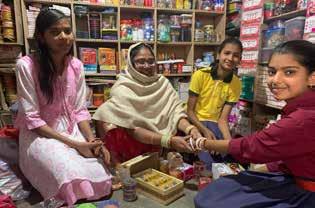
For the third year in a row, a landmark study has found once again that small loans and access to financial services for people living in poverty in Asia has helped improve their livelihoods.
The impact measurement company 60 Decibels surveyed 1,905 Opportunity International Australia clients from five of Opportunity’s local partners in India and Indonesia earlier this year. Of those surveyed, 93 per cent reported increased income and improved quality of life thanks to their small loan.
It’s not only income that has increased for families living in poverty. With a small loan, the family’s whole livelihoods have improved, with more children being sent to school and healthier meals being served at home.
Having access to banking and saving has also helped families become more resistant against any major unexpected expenses. Eighty-nine per cent of participants claimed that they are in a much better position to manage their finances now, thanks to having a microfinance institution’s support.
For those living in poverty, microfinance institutions are a pathway for financial security. These families often live in rural and remote areas and do not have access to major banks, or the collateral required for a loan. The ability to access a small loan to start a business is life-changing.
“I opened a business selling animal feed,” said one of the survey respondents. “At first, I only sold chicken feed on the terrace of my house. After getting a loan I started selling it in the shop and increased the types of feed that I sell. Now fish and cat food are available and my shop is quite wellknown to the public.”
Opportunity International Australia is excited to announce the appointment of Fifi Rashando to the Executive Committee of the Australian Disability and Development Consortium (ADDC).
Fifi re-joined Opportunity in August 2024 as the GEDSI (Gender Equity Disability and Social Inclusion) and Safeguarding Manager, working closely with our Programs team and local partners to strengthen our work in financial inclusion and international development. Fifi previously worked at Opportunity between 2001 and 2008, leading multidisciplinary teams in developing post-disaster economic programs in Asia, focusing on job creation, and building entrepreneurial skills – particularly focused on financial inclusion of women.
The Australian Disability and Development Consortium (ADDC) is an Australian network focused on advancing disability equity in the majority world. Their work ensures that the voices and rights of people with disabilities are elevated and reflected in all Australian international development policies and programs.
“I am honoured to join the ADDC executive committee, representing Opportunity and sharing a commitment to combat exclusion and promote equal opportunities for people with disability,” said Fifi.
“In international development, incorporating people with disabilities is vital for addressing intersectional vulnerabilities and promoting inclusive programming. As the largest minority group, 15 per cent of the global population has disabilities.”
Below: Fifi Rashando (front row, left) with the ADDC Executive Committee.
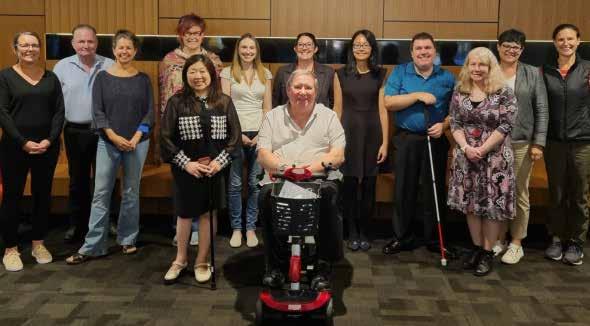

“Now that we have a business, life is better.” Razia
Razia and her husband Gulab live in rural Gujarat, India, and have three adult children, as well as grandchildren.
The couple worked in farming jobs and were not paid well. Life was tough and due to the lack of decent work in their village, often one of them would have to go away for three days at a time to work to seek better options.
They worked on others’ lands for wages, where they felt like they were at the mercy of the wealthier land-owners. They didn’t always have enough money even to meet their basic needs like food for the family.
Razia applied for a Buffaloan with Opportunity International Australia’s local partner. Razia saw the opportunity to build a buffalo milk business, and with the help of a Buffaloan and her dedication, Razia bought her first buffalo.
She used her knowledge of the fodder and grass varieties in the areas to gather nutritious feed for the buffalo, and the skills she’d learned tending to buffaloes in her farming jobs.
Her business has grown thanks to subsequent Buffaloans, and Razia now tends to six buffaloes and 12 cows. She milks them herself, yielding about 100 litres of milk a day. The family keep enough milk for their tea, and sell the rest. Gulab works at the local milk chilling plant, owned by dairy cooperative Amul, where Razia sells her milk.
Razia works hard, with a typical day being dawn till midnight. She tends to the animals, including chickens and goats, cleans the shed, milks the buffaloes and organises the milk to be delivered to the plant.
She has been able to improve her family’s income and quality of life. With the money earned from her business, Razia and Gulab were also able to open a small snack shop nearby, which their son Javed runs.
Owning two small businesses is a busy life, but they have improved their financial situation substantially. They have been able to make renovations to their house and provide better meals for the family.
“Our life improved a lot because of the loan, we installed solar, installed a borewell, bought motorbikes, cows and buffaloes,” said Razia. “If we take another loan, we will use it for the shop, and maybe a water tank.”
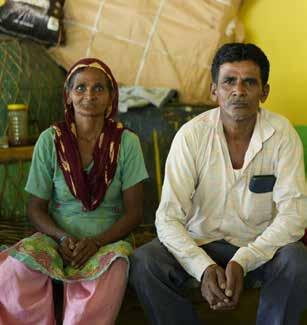

Led by our local partners, your support helps provide small loans to over 6 million entrepreneurs in Asia. This helps them build their businesses, earn regular incomes and create a future for their families.
Here are the stories of some of the women who have been supported with a small loan.
With a boom in housing developments around Lubuklinggau in South Sumatra, Indonesia, Suryani saw a golden opportunity and started a business collecting and selling river stones.
With a small loan, Suryani purchased materials to build her own river vessel to collect stones in the river near her home. Using old inner tubes from heavy machinery wheels, these handmade vessels helped her move stones upstream to the riverbank to sell on to developers to meet a demand for building materials.
Thanks to her persistance and hard work, Suryani’s sales turnover has increased and she hopes to continue to develop her business even more to help the family financially and meet her children’s education needs.
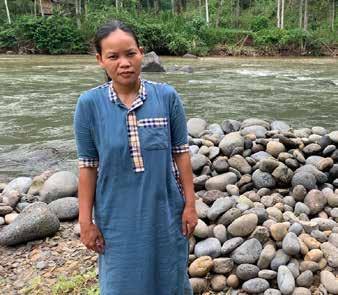
Weaving traditional batiks and textiles
Desriana lives in Rote, Indonesia, and has been weaving since she married her husband, Yandri. Learning the craft from her in-laws, she used a small loan to buy additional fabrics, colours, dyes and equipment to get her weaving business off the ground. Before receiving a small loan from Opportunity’s local partner in Indonesia, Desriana struggled to sell more than one or two batik or textile pieces at a time and wasn’t able to produce as much product as she wanted. Now that she’s increased her production line and is weaving more textiles, she’s able to hang them up at her home where she sells them. Better yet, her traditional designs are catching the eyes of the local community and she’s now selling five to six pieces a month. She’s hoping the loan and her profits from it will help her buy more sewing thread and coloured dyes so her weaving can become even more popular.
Below: Desriana has a successful weaving business in Rote, Indonesia.

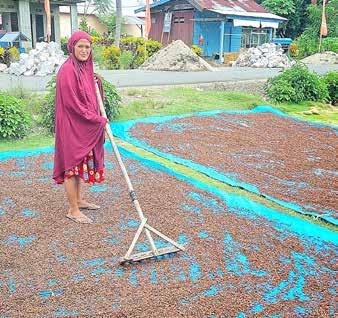
Cloves are an integral part of Indonesian cooking, lending their flavour to traditional dishes like Rendang, Nasi Goreng (fried rice), and Soto Ayam (a traditional noodle dish). They are also used in medicines. Surianti has a small clove plantation in Samaturu and needed capital to hire staff to help with the harvest this year as well as investing in new equipment.
Surianti has three children, two sons and a daughter. Her eldest son Arpiat (19) is starting a family of his own, her second son Askar (13) is in high school, and daughter Nurul (8) is in primary school.
Surianti was concerned that if she had to delay her harvest, the drying process would be hampered because it would coincide with a month of heavy rains, which would then impact on the quality of her cloves and her sales and ability to provide for her family.
She took out a small loan from Opportunity International Australia’s local microfinance partner and was able to hire clove pickers to harvest her cloves, and buy clove-picking equipment including ladders, ropes and sacks, as well as food to feed the workers while they were working in her plantation.
By being able to employ pickers, Surianti provided jobs in her local community, and together they harvested her crop smoothly and quickly and with enough time to dry the cloves ready for selling. She sells the dried cloves to vendors in the area, and sells them directly at the local market. Surianti is extremely thankful for the loan that allowed her clove harvest to proceed successfully this year, enabling her to better provide for her family’s needs. She hopes that her children can continue their education, setting them up to get good jobs and earn a higher income in future.
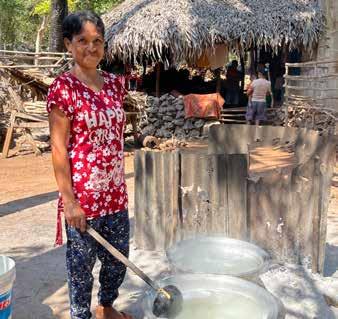
With six children to support – ranging in age from 20 to just one year old – Bathsheba and her husband farmed seaweed as their primary income source. Seaweed is an environmentally friendly crop with a long tradition in Indonesia, one of the world’s largest producers of farmed seaweed. However, crops are seasonal, prices are volatile, and seaweed crops and equipment are susceptible to extreme weather events. This makes it hard for seaweed farmers to generate a sustainable income.
After a cyclone wiped out their crop in 2021, Bathsheba and her husband tried their hand at making palm sugar syrup to improve their income.
With the help of a small loan from Opportunity’s local partner, they were able to buy supplies to get their business started.
They rise at 3am every day to avoid the hot sun – her husband climbs the palm trees to extract the sap in the cool of the morning. He scales the trees with ease, reaching the top by placing his feet in small grooves cut into the trunk of the tree; a simple tool and bottle to collect the sap attached to a belt around his waist. Bathsheba cooks the sugar syrup, stirring the sap and reducing it down into a thick syrup. Once it has cooled, she bottles and sells the honey-coloured sugar syrup to families in her neighbourhood.
Their eldest son now runs the seaweed farming business, while the palm sugar business is now their primary source of income. They see a lot of potential to grow their sustainable production of palm sugar, and are focused on helping their children continue their education. “The money we are saving from selling the palm sugar will be enough for us to send our children to university,” said Bathsheba.
Above: Bathsheba has a successful palm sugar syrup business, thanks to a small loan.
Like most first-time parents, Monzila and her husband were excited to be having a baby. But giving birth at home without a midwife or doctor, the situation became dangerous.
She and her husband hadn’t been taught what to do during pregnancy or labour. Monzila did not have regular check-ups throughout her pregnancy, and no plan was in place for the delivery. Her family also had a misbelief that if an expectant mother ate too much it would cause complications for the baby. So Monzila was malnourished by the time she gave birth.
Their daughter was born weighing just 1.7kg –half the average weight for newborns. The baby was malnourished and suffered from not getting enough oxygen and nutrients before or during birth. Monzila and her newborn spent nine days in intensive care, but thankfully survived.
Many families in poverty like Monzila’s live in remote areas beyond the reach of traditional health services. They often can’t access it or can’t afford it.
Central and southern Asia have the second highest neonatal mortality rate in the world – a rate 10 times higher than Australia. The majority of these infant deaths are often connected to a lack of quality care at birth or in the first month of life. The lack of knowledge and awareness of the risks of pregnancy for women and their babies is a serious issue.
Two years later, Monzila fell pregnant with her second child. Luckily this time, a local Health Leader named Renuka helped Monzila. Using flash cards, she shared information about antenatal care and nutrition and encouraged Monzila to have regular check-ups with a doctor. She helped the family plan for delivery at a health centre on top of a home back-up plan that included a skilled birth attendant and a safe birth kit. As a result, Monzila gave birth at the health centre to a healthy baby girl.
“If I had the opportunity to know these things earlier, I would not have been in so much danger during the pregnancy and birth of my first child,” said Monzila.
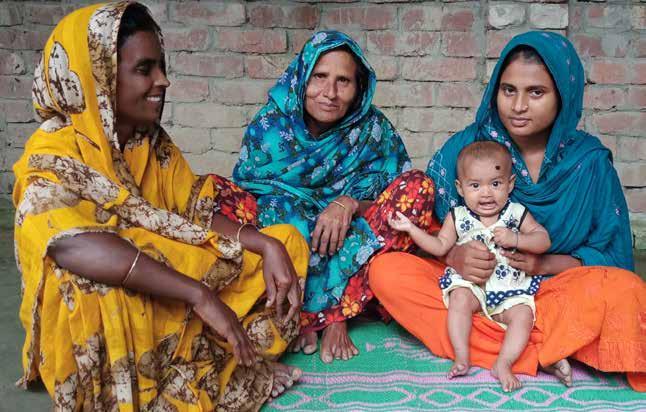
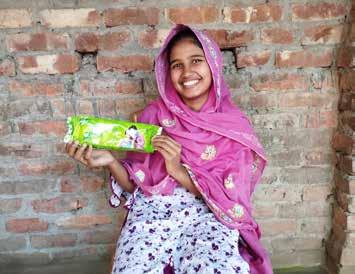
Rags. Sawdust. Leaves. Grass and paper. These are not items most of us would immediately associate with a woman’s menstrual cycle.
In some areas of countries such as India and Bangladesh, those are the makeshift items many women and girls are using to manage their period every month. With menstruation starting on average at 12 years old and lasting until around 51, that is a likely 39 years or 468 months of a woman’s life using items that can cause infection every month.
Period poverty refers to an inability to afford or access sanitary products, toilets or hygiene facilities, coupled with a lack of awareness around menstrual health.
In India, the recent National Family Health Survey found that 22 per cent of women are not using sanitary products. In some of the poorest states, such as Bihar, the figure is as high as 41 per cent. If you can’t access sanitary products, can’t afford them or don’t even know about them in the first place, what choice do you have?
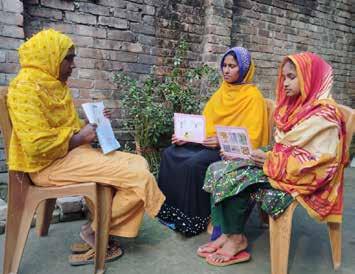
The unknown danger every month In a remote village in Bangladesh, 14-year-old Sumaiya got her first period when she was 10 years old. Terrified at seeing blood in her pyjamas, Sumaiya recalls running to her mother in tears, worried she might be dying.
Her mother Nargis was able to explain it was her period, but instructed Sumaiya to use a cloth rag to manage the bleeding and to change it once a day.
Often considered a taboo subject in many communities, menstruation is rarely spoken about. As a result, many girls end up using the inadequate solutions women did generations ago – despite the nowknown health risks – like reusing rags during menstruation without properly cleaning them.
It wasn’t until Opportunity’s Health Leader program reached Nargis and Sumaiya’s village that they learned the dangers of using old cloths during menstruation. Introduced to sanitary pads, they were also taught the importance of changing them every four to six hours to avoid infection.
Ending period poverty comes down to improving three key factors: affordability, access and awareness. Opportunity’s Health Leader program sees local women trained in basic healthcare, with an emphasis on menstrual health and hygiene. As they share their knowledge with other households, they’re able to improve the health and wellbeing of women and girls across their entire community.
Some women are trained as Health Entrepreneurs, establishing their own healthrelated businesses and supplying such things as sanitary products affordably in rural and remote communities where access is limited, and women and girls would otherwise have to travel long distances to purchase them.
Thanks to your generous support, Opportunity can reach more women and girls like Nargis and Sumaiya with the knowledge and products they need to manage their periods safely.

Long-time Opportunity International Australia supporter and ambassador Jeff Robson recently took on the harrowing challenge of trekking the Kokoda Track in Papua New Guinea to raise money for women and families living in poverty.
Jeff has been an Opportunity supporter for more than 20 years, and as an ambassador has helped raise the profile of the organisation, as well as funds.
“As a business owner, I loved the idea of a hand-up, rather than a hand-out and also love the fact that the funds are constantly recycled,” said Jeff.
Jeff was always interested in trekking the Kokoda Track, and when the opportunity presented itself, he jumped on board. Jeff’s grandfather and great uncle both fought in World War II and he wanted to honour them on this adventure.
“My grandfather fought in Italy in World War II and was one of the fortunate ones who returned home to New Zealand,” said Jeff.
“He never spoke about what happened during the war and my grandmother always says that he came back a much ‘harder’ man than he was before he went.
“In those days, no one ever spoke about mental health, and I can only imagine how hard it would’ve been for him. His coping mechanism was to go on long bike rides around the North Island of New Zealand, sometimes disappearing for days at a time.
“He’d also take my dad out climbing sometimes. This later inspired my dad to climb many of the mountains in the Southern Alps of New Zealand, and seeing pictures of him standing on the tops of snow-covered mountains or deep in an ice-blue cave inspired me to take up climbing.”
The beginning of Jeff’s adventure was slightly delayed due to aeroplane problems in Port Moresby, so to make up the time, the group trekked about 50 per cent longer on the first two days than had been planned.
“Those first two days were also really steep so at the very end of the second day, my left knee had developed a sharp pain,” said Jeff.
“Fortunately, I was able to rest it, take some painkillers and put a brace on it for the next day and this was enough to see me through without any pain.”
The trek took the group of 30 people nine days to complete. There were 10 trekkers from Australia, with one porter assigned to each, plus another 10 general porters to carry all the gear, food and other equipment.
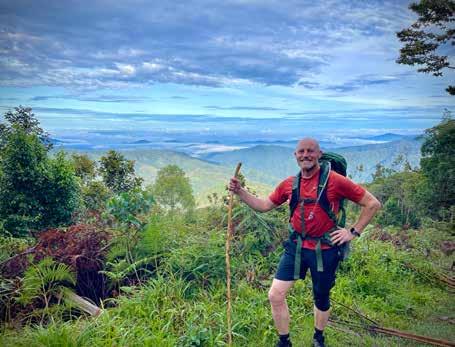
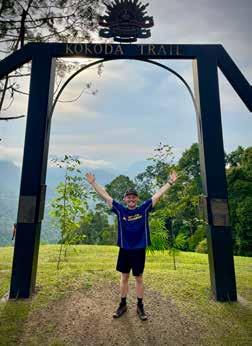
The Kokoda Track is infamous for being one of the most treacherous and difficult passages to navigate. Most of the trek was done in quite hot and humid conditions, especially the start and end due to lower altitudes.
“As we got higher, things started to cool off and at the highest point (2,243m), it was actually quite cold if we stopped for any length of time,” said Jeff.
“We were quite fortunate with the weather as it was dry during the day and only rained at night… every night! This cooled things down but also meant that the track was constantly covered in sticky, brown mud. Combined with the tangle of tree roots and moss-covered rocks, this made for a very treacherous track! You had to concentrate the whole time to make sure you didn’t fall over and didn’t twist your ankle.”
“There’s very little of the 96km of the track that’s actually flat. Most of it is very steep, going either up or down and both are very physically taxing so each night, everyone was absolutely exhausted after trekking for 8-10 hours. We’d all go to sleep superearly, then wake up each morning at 5am, ready to pack up and start hiking again by 6.00-6.30am.”
Jeff and the rest of the team did a lot of training to get fit and be prepared for the brutal reality of the conditions.
“It’s not one to be taken lightly and we actually passed several memorials to previous hikers who had died along the track because they were out of shape,” said Jeff.
When asked what got him through each day, Jeff answered:
“Aside from the training, the comradery amongst the group was a big factor. Just chatting to each other seemed to make the kilometres pass more easily as it took your mind off how hard the track actually was! Having good food and nutrition was also really important to help us make it through each day. One day, I ran out of food and really noticed the difference in energy levels!”
When the team made it to the finish line, it was a special moment.
“The porters went on ahead of us to prepare an arrival party for us where they were singing the song they always played for us when we reached the top of a big hill,” said Jeff.
“This time, they’d taken our hiking poles to form a little archway we all walked through. It was a beautiful and fitting end. So many emotions in those last few moments: relief that it’s finally over, a massive sense of joy and happiness, and accomplishment for what we’ve just done.
“There was also sadness that our little group that had gone through so much together would soon disband, admiration for the soldiers who did this before us in far worse conditions, and thankfulness that we’d all made it through safely.”
In total, Jeff managed to fundraise more than $7,000 in support of Opportunity International Australia. This helps reach more than 40 women with small loans and other support to help them and their families leave poverty behind.
Thank you so much Jeff for your ongoing support of Opportunity. We can’t wait to see where your adventures take you next!
In September, Opportunity International Australia launched a new initiative to connect with our network of incredible women, and men invested in women, to learn about purpose, leadership and women’s empowerment.
Titled TransformHER, the series kicked off with an online event with guest speaker Peta Taylor from The Karuna Collective giving her insights and tips on how to unlock your potential and find joy and purpose in your work.
Hosted by Nicole Clements, Head of Marketing and Communications at Opportunity and former ABC journalist, the online event brought more than 50 women and men together to connect in their mission to empower women.
Joining the event was Loralle Slater, Chief Sales and Marketing Officer at RedZed, one of Opportunity’s valued corporate partners. Loralle spoke about female leadership and taking the time to invest in people as being a great strength of her organisation.
The Karuna Collective Founder and CEO Peta Taylor, first heard about the work of Opportunity helping women with small loans when she worked at SilverChef, a long-term corporate partner of Opportunity. The work of Opportunity resonated strongly with Peta, empowering women in their own businesses.
“Using business as a force for good and Opportunity’s focus on providing microloans to empower women experiencing poverty globally resonates with my vision of creating sustainable change and fostering economic independence so that every woman has the opportunity to thrive,” said Peta.
The next TransformHER event will be held on 20 November at 7pm online with guest speaker Alana Nicholls from Pro Purpose, who will talk about connecting purpose to your business. Opportunity is happy to partner with Pro Purpose who help small and medium businesses connect their brands with generosity.
Visit opportunity.org.au to find out how to register. You won’t want to miss it!
Peta Taylor
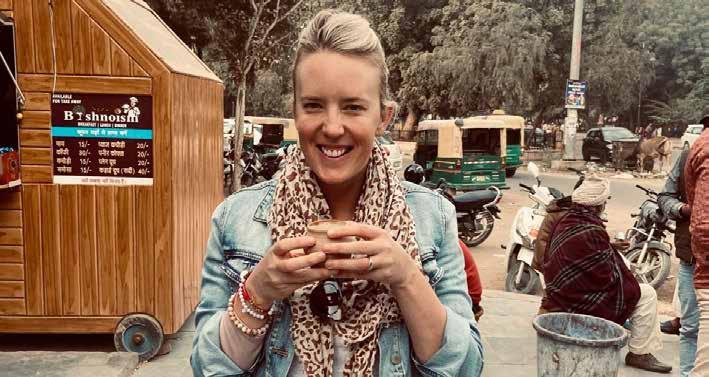
By giving a Gift of Opportunity, you’re helping end poverty in developing countries – one family and one community at a time.
Check out the enclosed catalogue and order form to get your Christmas shopping done early! Or you can order online at gifts.opportunity.org.au



Thank you for your continued generosity
It’s thanks to your support that we have been able to increase our investment in programs that create new opportunities for resilient and hard-working women and families across Asia.
Thanks to you, we have been able to protect and build more businesses, help more children attend school, reach more women and girls with anti-violence and human trafficking awareness and protection, and extend our health program by training more Health Leaders.


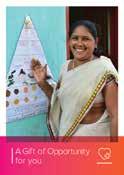




With deepest gratitude, and sincerest thanks from the Opportunity International Australia team. On behalf of those we serve.












Opportunity International Australia is an Australian Council for International Development (ACFID) Member and is committed to full adherence to the ACFID Code of Conduct.
Opportunity International Australia receives support from the Australian Government through the Australian NGO Cooperation Program (ANCP).
Opportunity International Australia is a member of the Australian Disability and Development Consortium (ADDC). The ADDC is a network of agencies, organisations and individuals with an interest in disability-inclusive development within Australia and internationally.
“
